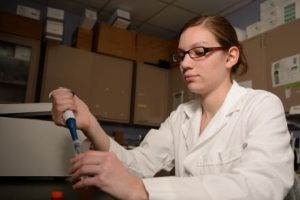Michigan State University researchers in the College of Veterinary Medicine have identified a genetic mutation in Doberman pinschers that causes a type of albinism with characteristics evident in both humans and dogs.

Paige Winkler, a doctoral student in the College of Veterinary Medicine, co-led the study with Joshua Bartoe, an assistant professor in the Department of Small Animal Clinical Sciences, and discovered a mutated gene that is associated with a form of albinism in humans.
"What we found was a gene mutation that results in a missing protein necessary for cells to be pigmented," Winkler said. "Some defects in this same gene cause a condition called oculocutaneous albinism in humans."
This type of albinism has certain characteristics that are evident in both humans and dogs.
The canine breed and people also experience the same skin sensitivity to sunlight, which results in an increased risk of skin tumors.
The results of their research could be of great importance to Doberman breeders around the world.

"Because Dobermans can carry the defective gene, but show no signs of the disorder, this has posed serious problems among breeders," Bartoe said. "But now that we've identified the mutation, we can look at the genetic makeup of these dogs and determine if they might be carriers."
See the full story at MSU Today.
The team's research findings can be found in PLOS ONE.
May 12, 2014
